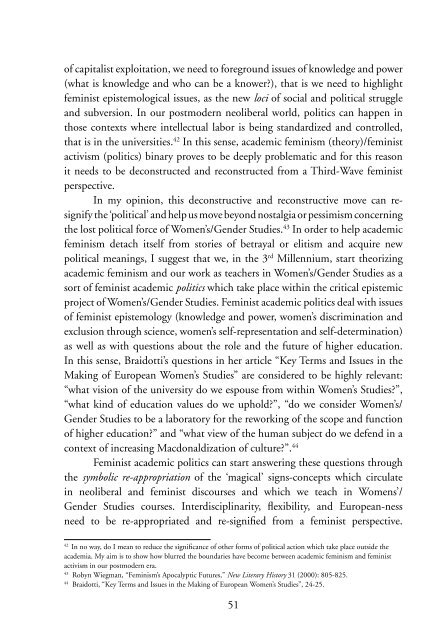Teaching with the third wave new feminists - MailChimp
Teaching with the third wave new feminists - MailChimp
Teaching with the third wave new feminists - MailChimp
You also want an ePaper? Increase the reach of your titles
YUMPU automatically turns print PDFs into web optimized ePapers that Google loves.
of capitalist exploitation, we need to foreground issues of knowledge and power(what is knowledge and who can be a knower?), that is we need to highlightfeminist epistemological issues, as <strong>the</strong> <strong>new</strong> loci of social and political struggleand subversion. In our postmodern neoliberal world, politics can happen inthose contexts where intellectual labor is being standardized and controlled,that is in <strong>the</strong> universities. 42 In this sense, academic feminism (<strong>the</strong>ory)/feministactivism (politics) binary proves to be deeply problematic and for this reasonit needs to be deconstructed and reconstructed from a Third-Wave feministperspective.In my opinion, this deconstructive and reconstructive move can resignify<strong>the</strong> ‘political’ and help us move beyond nostalgia or pessimism concerning<strong>the</strong> lost political force of Women’s/Gender Studies. 43 In order to help academicfeminism detach itself from stories of betrayal or elitism and acquire <strong>new</strong>political meanings, I suggest that we, in <strong>the</strong> 3 rd Millennium, start <strong>the</strong>orizingacademic feminism and our work as teachers in Women’s/ Gender Studies as asort of feminist academic politics which take place <strong>with</strong>in <strong>the</strong> critical epistemicproject of Women’s/Gender Studies. Feminist academic politics deal <strong>with</strong> issuesof feminist epistemology (knowledge and power, women’s discrimination andexclusion through science, women’s self-representation and self-determination)as well as <strong>with</strong> questions about <strong>the</strong> role and <strong>the</strong> future of higher education.In this sense, Braidotti’s questions in her article “Key Terms and Issues in <strong>the</strong>Making of European Women’s Studies” are considered to be highly relevant:“what vision of <strong>the</strong> university do we espouse from <strong>with</strong>in Women’s Studies?”,“what kind of education values do we uphold?”, “do we consider Women’s/Gender Studies to be a laboratory for <strong>the</strong> reworking of <strong>the</strong> scope and functionof higher education?” and “what view of <strong>the</strong> human subject do we defend in acontext of increasing Macdonaldization of culture?”. 44Feminist academic politics can start answering <strong>the</strong>se questions through<strong>the</strong> symbolic re-appropriation of <strong>the</strong> ‘magical’ signs-concepts which circulatein neoliberal and feminist discourses and which we teach in Womens’/Gender Studies courses. Interdisciplinarity, flexibility, and European-nessneed to be re-appropriated and re-signified from a feminist perspective.42In no way, do I mean to reduce <strong>the</strong> significance of o<strong>the</strong>r forms of political action which take place outside <strong>the</strong>academia. My aim is to show how blurred <strong>the</strong> boundaries have become between academic feminism and feministactivism in our postmodern era.43Robyn Wiegman, “Feminism’s Apocalyptic Futures,” New Literary History 31 (2000): 805-825.44Braidotti, “Key Terms and Issues in <strong>the</strong> Making of European Women’s Studies”, 24-25.51
















